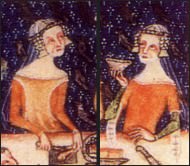FROM FOOTNOTES TO NARRATIVE: WELSH NOBLEWOMEN IN THE THIRTEENTH CENTURY
Richards, Gwenyth
PhD Thesis, University of Sydney (2005)
Abstract
This thesis concentrates on the role of Welsh noblewomen in the history of Wales in the thirteenth century. Their absence from this history until quite recently is discussed, and several outstanding Welsh noblewomen have been studied in detail. The women studied include the mothers, wives and daughters of the native Welsh rulers of Gwynedd as well as noblewomen from northern Powys, Cydewain, Ceredigion, and so on. One chapter of the work is devoted to the Welsh Laws of Women which, although somewhat archaic by the thirteenth century, were still in use in some parts of Wales and help provide background. Another chapter investigates the evidence for women in the extant literature and poetry of the period. The thesis explores the themes of women’s access to power through the family and also the ability of Welsh noblewomen to take action in their own and their family members’ interests, in the public sphere, when they felt it was necessary. While the later years of the thirteenth century witnessed the final defeat of the Welsh by the Anglo-Normans after more than two hundred years, earlier in the century, Welsh leaders had been able to unite under the leadership of the rulers of Gwynedd and achieve a measure of independence from their oppressors. Welsh noblewomen played an important part in this recovery of Welsh power and their participation in this aspect of Welsh medieval history is also explored. It is clear from the evidence collected that most of the noblewomen studied owned land, in spite of the prohibition against women owning land under native Welsh law. Welsh noblewomen supported their fathers, husbands and sons, and they also took direct action themselves when the need arose.
FROM FOOTNOTES TO NARRATIVE: WELSH NOBLEWOMEN IN THE THIRTEENTH CENTURY
Richards, Gwenyth
PhD Thesis, University of Sydney (2005)
Abstract
This thesis concentrates on the role of Welsh noblewomen in the history of Wales in the thirteenth century. Their absence from this history until quite recently is discussed, and several outstanding Welsh noblewomen have been studied in detail. The women studied include the mothers, wives and daughters of the native Welsh rulers of Gwynedd as well as noblewomen from northern Powys, Cydewain, Ceredigion, and so on. One chapter of the work is devoted to the Welsh Laws of Women which, although somewhat archaic by the thirteenth century, were still in use in some parts of Wales and help provide background. Another chapter investigates the evidence for women in the extant literature and poetry of the period. The thesis explores the themes of women’s access to power through the family and also the ability of Welsh noblewomen to take action in their own and their family members’ interests, in the public sphere, when they felt it was necessary. While the later years of the thirteenth century witnessed the final defeat of the Welsh by the Anglo-Normans after more than two hundred years, earlier in the century, Welsh leaders had been able to unite under the leadership of the rulers of Gwynedd and achieve a measure of independence from their oppressors. Welsh noblewomen played an important part in this recovery of Welsh power and their participation in this aspect of Welsh medieval history is also explored. It is clear from the evidence collected that most of the noblewomen studied owned land, in spite of the prohibition against women owning land under native Welsh law. Welsh noblewomen supported their fathers, husbands and sons, and they also took direct action themselves when the need arose.
century witnessed the final defeat of the Welsh by the Anglo-Normans after more than two hundred years, earlier in the century, Welsh leaders had been able to unite under the leadership of the rulers of Gwynedd and achieve a measure of independence from their oppressors. Welsh noblewomen played an important part in this recovery of Welsh power and their participation in this aspect of Welsh medieval history is also explored. It is clear from the evidence collected that most of the noblewomen studied owned land, in spite of the prohibition against women owning land under native Welsh law. Welsh noblewomen supported their fathers, husbands and sons, and they also took direct action themselves when the need arose.
Click here to read this thesis from the University of Sydney
Subscribe to Medievalverse
Related Posts